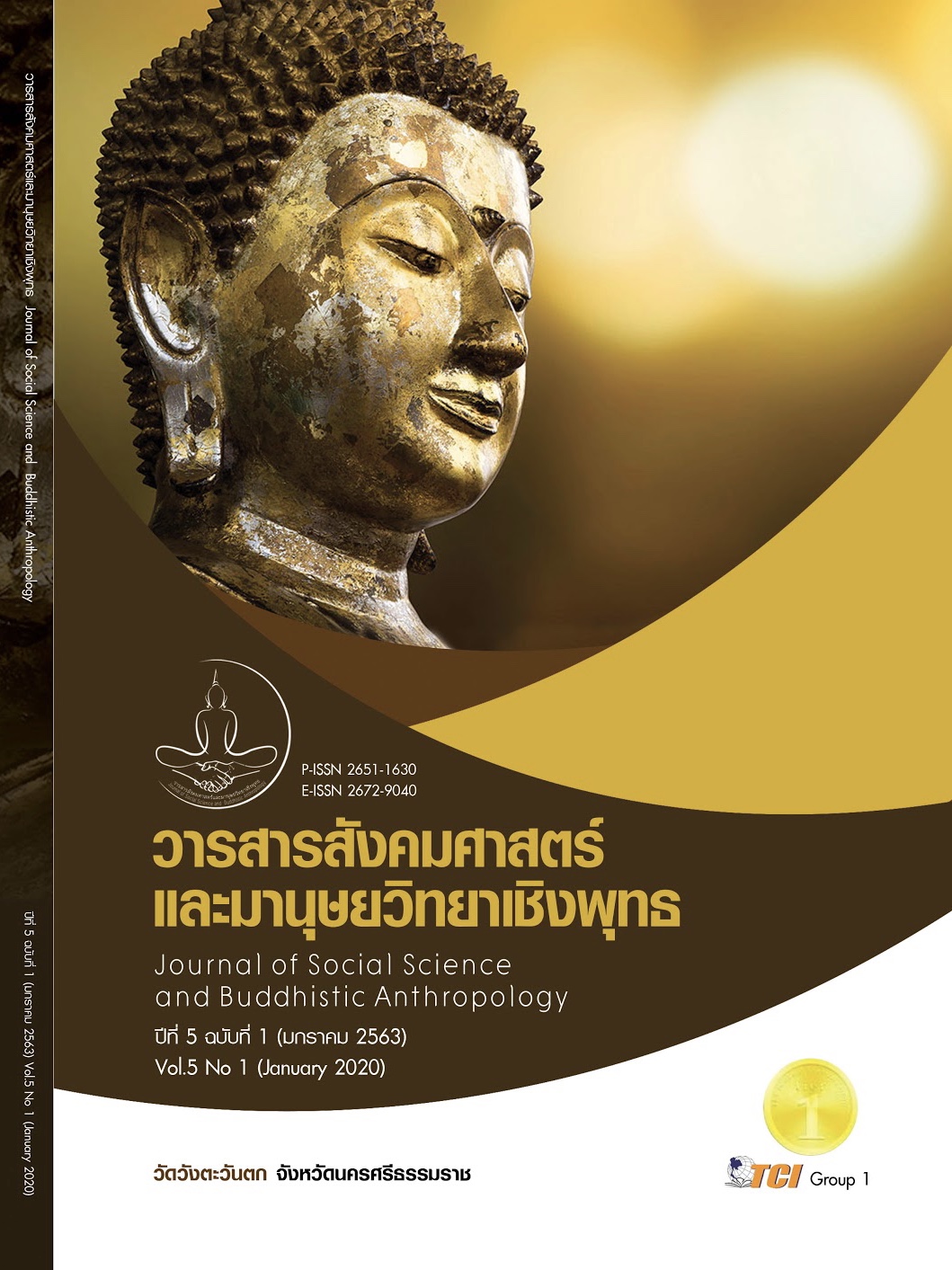A MODEL OF WORKING PROCESS OF VOLUNTEER MONKS FOR SOCIETY BASED ON BUDDHIST PSYCHOLOGY
Keywords:
Working Process, Volunteer Monks, Buddhist PsychologyAbstract
The purposes of this article were 1) to study working process of volunteer monks for society from best practices, 2) to analyze working process of volunteer monks for society based on Buddhist Psychology, and 3) to propose a model of a working process of volunteer monks for society based on Buddhist Psychology. Qualitative research was used for research design. Research tool was interview guideline and data were analyzed by using content analysis and analytic induction. Results indicated that 1) there were five steps of working process of volunteer monks for society from best practices. The process consisted of the first step was to set the target of being volunteer monks, the second step was characteristics of volunteer monks, the third step was to focus on a working process for community, the fourth step was to transfer knowledge to others, and the fifth step was reflection of volunteer working. 2) There were five steps of a working process of volunteer monks for society based on Buddhist Psychology. The process were 2.1) to focus volunteer working, 2.2) to have Dhamma as role model, 2.3) to focus on active activity, 2.4) to build absolute mind, and 2.5) to receive results from volunteer working. 3) A developed model of working process of volunteer monks for society based on Buddhist Psychology consisted of Buddhist principles that used in working process of volunteer monks, namely Brahmavihara 4 and Sangahavatthu 4, and psychological principles for society were esteem needs and self-actualization needs. The working path of the volunteer monks was continuous by helping and alleviating physical suffering introducing the principle of relieving suffering and give morale to those who suffer. The model of working process of volunteer monk for society was called TAPAR model that came from Targeting, Attribute, Process focus, Aim to Convey, and Reflection.
References
กันธิชา เผือกเจริญ. (2556). ศึกษากระบวนการทำงานของจิตอาสากรณีศึกษาการดูแลผู้ป่วยมะเร็งระยะสุดท้ายอโรคยศาล วัดคำประมง จังหวัดสกลนคร. ใน วิทยานิพนธ์พุทธศาสตรมหาบัณฑิต สาขาวิชาพุทธศาสนาแห่งชีวิต. มหาวิทยาลัยมหาจุฬาลงกรณราชวิทยาลัย.
จิตรวลัย ศรีแสงฉาย. (2551). จิตอาสาพัฒนาชนบท กรณีศึกษา: กลุ่มอาสาพัฒนา มหาวิทยาลัยมหิดล. ใน สารนิพนธ์ศิลปศาสตรมหาบัณฑิต สาขาวิชาวิทยาการฟื้นฟูสมรรถภาพคนพิการ. มหาวิทยาลัยมหิดล.
ไชยรัตน์ เจริญสินโอฬาร. (2543). วาทกรรมการพัฒนา: อำนาจ ความรู้ ความจริง เอกลักษณ์และความเป็นอื่น. (พิมพ์ครั้งที่ 3). กรุงเทพมหานคร: วิภาษา.
ทิพย์ขจร ฉายาสกุลวิวัฒน์. (2555). ศึกษากระบวนการจิตอาสาตามหลักพระพุทธศาสนาของเจ้าหน้าที่เสถียรธรรมสถาน. ใน วิทยานิพนธ์พุทธศาสตรมหาบัณฑิต สาขาวิชาพุทธศาสนา. มหาวิทยาลัยมหาจุฬาลงกรณราชวิทยาลัย.
นพมาศ ธีรเวคิน. (2542). วมบทความเรื่องจิตวิทยา สังคมกับชีวิต รวบรวมจัดพิมพ์โดย นพมาศ ธีรเวคิน. (พิมพ์ครั้งที่ 3). กรุงเทพมหานคร: โรงพิมพ์มหาวิทยาลัยธรรมศาสตร์.
บุษราคัม จําปา. (2550). จิตอาสากับการบริการช่วยเหลือคนพิการกรณีศึกษา โครงการช่วยเหลือนักศึกษาพิการวิทยาลัยราชสุดามหาวิทยาลัยมหิดล. ใน สารนิพนธ์ศิลปศาสตรมหาบัณฑิต สาขาวิชาวิทยาการฟื้นฟูสมรรถภาพคนพิการ. มหาวิทยาลัยมหิดล.
ประเวศ วะสี. (2544). สุขภาวะทางจิตวิญญาณ. หมอชาวบ้าน, 22(216), 41-45.
พระชวลิต จนฺทวํโส (ถาวรศิริ). (2551). ศึกษาวิเคราะห์ เรื่องความมีน้ำใจในพระพุทธศาสนาเถรวาท. ใน วิทยานิพนธ์พุทธศาสตรมหาบัณฑิต สาขาวิชาพุทธศาสนา. มหาวิทยาลัยมหาจุฬาลงกรณราชวิทยาลัย.
พระวิเชียร สีหาบุตร. (2537). บทบาทพระสงฆ์กับการพัฒนาสังคม: ศึกษากรณี พระธรรมมหาวีรานุวัตร วัดไร่ขิง อำเภอสามพราน จังหวัดนครปฐม. ใน ดุษฎีนิพนธ์ปรัชญาดุษฎีบัณฑิต สาขาวิชาพัฒนศึกษา. มหาวิทยาลัยศิลปากร.
ไพศาล สรรสรวิสุทธิ์. (2550). การพัฒนาชุมชน. กรุงเทพมหานคร: รัฐศาสตร์สาส์น.
วรวุฒิ ศุภมณี. (2547). การศึกษาการปฏิบัติหน้าที่ต่อสังคมด้านการพัฒนาจริยธรรมของพระนิสิต มหาวิทยาลัยจุฬาลงกรณราชวิทยาลัย. ใน วิทยานิพนธ์สังคมสงเคราะห์ศาสตรมหาบัณฑิต สาขาวิชาสังคมสงเคราะห์. มหาวิทยาลัยธรรมศาสตร์.
สุธาทิพย์ แก้วเกลี้ยง. (2549). การพัฒนาจิตอาสาในแนวพระพุทธศาสนา. ใน สารนิพนธ์ศิลปศาสตรมหาบัณฑิต สาขาวิชาศาสนากับการพัฒนา. มหาวิทยาลัยมหิดล.
เสริญศิริ อัครพุฒิพันธ์. (2554). พุทธธรรมกับการทำงานจิตอาสา: กรณีศึกษามูลนิธิฮักเมืองน่าน. ใน วิทยานิพนธ์พุทธศาสตรมหาบัณฑิต สาขาวิชาพุทธศาสนาแห่งชีวิต. มหาวิทยาลัยมหาจุฬาลงกรณราชวิทยาลัย.
Fehring R.J. et all. (1997). Spiritual well-being, religiosity hope depression and other mood states in elderly people coping with cancer. Oncology Nursing Forum, 19(4), 663-671.
Klomkul L. et all. (2011). Effects of Reflection Process on Classroom Action Research Effectiveness: Mixed Methods Research. The 8th International Postgraduate Research Colloquium: Interdisciplinary Approach for Enhancing Quality of Life IPRC Proceedings.
Patumsawad T. (2016). The participation of citizens in building strong communities Case Study Community Don Muang Khong. Rajapark Journal, 10(20), 178-189.
Reed P.G. & Rousseau E. (2007). Spirital inquiry and well-being in life-limiting illness. Journal of Religion, Spirituality and Aging, 32(1). 81-98.
Tongprateep T. (2003). Spiritual health promotion. The Thai Journal of Nursing Council, 17(3), 51-61.









